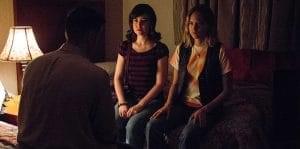
When I think of films that sensitively approach the subject of abortion and women’s rights, Mike Leigh’s Vera Drake and Cristian Mungiu’s 4 Months, 3 Weeks and 2 Days immediately come to mind. Though vastly disparate in terms of plot, tone, and setting, both of those films are powerful statements on the bureaucracy and injustice pro-choice women continuously face.
It would be a nearly insurmountable task for a first-time independent filmmaker to create an artistic statement that could compare with the works of said cinema masters. I wish I could say that Rachel Carey, who wrote and directed the historical feminist drama Ask for Jane, proved me wrong, but her competently-assembled film – on top of being didactic, schematic, and predictable – contains nary a sequence of creative inspiration, nor a juicy trademark of an auteur-in-the-making.
It’s really too bad, as in this era of #MeToo and #TimesUp, cinema is flooded with a tidal wave of politically correct, pedagogical “message movies” and could use one that’s subtle, succinct and, you know, original (see Barry Jenkins’ Moonlight for a rare example of such a feature). Right off the bat, Ask for Jane announces its prune-dry presence as a historical lesson / cinematic reenactment of a tale “inspired by real events,” its archive-footage-laden opening montage ending on a Venus symbol stamped across the screen. So much for subtlety.

“…Rose vows to remedy the injustice by forming a ‘Women Liberation Meeting’…”
Utilizing the good ol’ method of starting her story in the present (or, in this case, 1972) – wherein the protagonists are locked up in jail – and then taking us back four years to how it all began, Carey doesn’t take long before resorting to gratuity to hammer her point across: a pregnant girl, her life ruined, commits suicide by jumping off a roof.
Cut to: University of Chicago. When Rose’s (Cait Cortelyou) roommate Patty (Lilly Englert) gets pregnant and suicidal, Rose vows to remedy the injustice by forming a “Women Liberation Meeting,” wherein she and her female dorm-mates help pregnant girls seeking help. All you have to do is simply call and “ask for Jane.”
Next thing Rose knows, the phone’s ringing off the hook, and “it’s not just students anymore” – “all sorts of women” end up coming for help. Multiple obstacles arise: it’s nearly impossible to find a decent doctor who’s not “in the mob” or an a*****e; Rose’s politically-inclined fiancée Bill (Ben Rappaport) demands that she quits activism after they get married; her uptight mother stands in her way; and, of course, there’s the law and all. Defying authority eventually leads to the inevitable court trial, the outcome of which you either already know (since it’s based on real events) or not.

“…worth mentioning is Ask for Jane’s mostly-female crew – certainly a praiseworthy achievement in a male-dominated industry.”
Ask for Jane is chockfull of either obvious or awkward lines of dialogue. “If you’re working for the police, I will find and kill you,” a shady character nonsensically proclaims. “You ladies need to start keeping your legs together,” a sleazy abortionist tells the girls, “this wild behavior just leads to trouble.” “It’s always the woman,” one of Rose’s roommates, Janice (Cody Horn), a keen human rights activist (and keener hippie) says pointedly, “you notice that?” “If there’d been a female leader in there, this wouldn’t have happened,” she says later, hammering the point home.
It’s not the content that’s objectionable. It’s the crudely pedagogical manner in which it’s presented. If I wanted to attend a lecture – which, by the way, would most likely be more entertaining, quick-witted and informative than Ask for Jane – I’d sign up for one of my former college professor’s courses. Carey sacrifices character development and true incisiveness in service of getting its messages across. All the male characters are either unemployed scumbags or vehement douches. For a film that purports to endorses equality and female empowerment, its female characters are so uniformly idealistic they’re borderline interchangeable.
It’s no fault of the leads, who manage to display some real chemistry, delegated to infusing lines revolving solely around the film’s central themes with a modicum of vivacity. Carey intermittently – and frustratingly – shows that she can direct a subtle sequence, such as Donna (Sarah Steele), one of Rose’s protégés, making her first call to a nervous mother who absolutely “can’t have another kid.” Also worth mentioning is Ask for Jane’s mostly-female crew – certainly a praiseworthy achievement in a male-dominated industry.
Too bad the undoubtedly important, relevant themes are presented in such an outdated, inconsequential manner. Those women’s story deserves to be told properly. May I Ask for Jane Campion to give it a try?

Ask for Jane (2019) Written and Directed by Rachel Carey. Starring Cait Cortelyou, Cody Horn, Sarah Ramos, Sarah Steele, Chloe Levine, Sophie von Haselberg, Alison Wright.
4 out of 10
